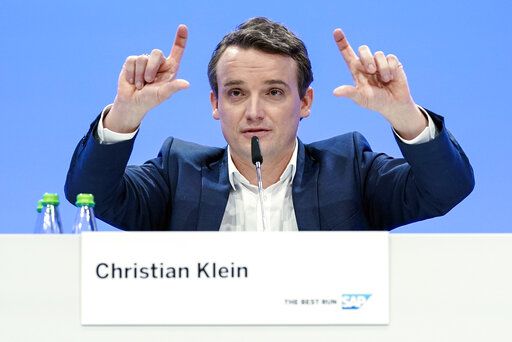Insider Q&A: SAP-CEO-Christian Klein
Christian Klein, CEO of the software group SAP, gestures during the annual press conference of the software group SAP in Walldorf, Germany, on January 29, 2021. April 2022 marks SAP’s 50th anniversary and the culmination of Christian Klein’s first year as sole CEO. (Uwe Anspach/Pool via AP)
Christian Klein was a teenager the first time he set foot in SAP’s headquarters in Walldorf, Germany as an intern.
Now the 41-year-old is the CEO of the software giant and steering its revenue shift from licensing fees to cloud computing subscriptions.
April marks SAP’s 50th anniversary and the culmination of Klein’s first year as sole CEO. He previously shared the role for several months with co-CEO Jennifer Morgan.
Klein spoke recently with The Associated Press.
Q: Ukrainian President Volodymyr Zelenskyy had strong words for SAP, asking the company and others to stop supporting software clients in Russia and saying there’s no ‘half measures.’ How have you responded?
A: Right after the outbreak of the war and the invasion of Ukraine, SAP took immediate action. We stopped the sale of all of our products and services. Needless to say, on top of that, we are not supporting any kind of sanctioned customers. The European Union and others have released further sanctions, which we’re also following, especially in the energy sector. We also decided to wind down our cloud business. We shut it down completely, almost our complete business in Russia. It was very important for us to have a very clear stance around this invasion of Ukraine and this terrible war.
Q: So you are not supporting existing software deals and clients, say a hospital or the food supply chain?
A: Not in the cloud business. On the on-premise side, we are following the sanctions which just got expanded. What is left on the on-premise side is customers for civil infrastructure, but nothing more.
Q: What was SAP like when you first visited back in 1999?
A: When you grow up in the area of Heidelberg, there’s no way that you can avoid SAP. I did an internship during my school days. I was the one who had to carry the monitors — not a flat screen at that time — these were the huge ones. I can really say I learned from the ground up. Already at that point of time, believe it or not, you were part of the family. You were part of this culture. One of the strongest assets is that people really have special connections with the company. And that was carried over from generation to generation.
Q: Can you speak about the complaints SAP sometimes gets from end users about the complexity of putting in a sales order or filing timesheets?
A: We need to simplify the way we develop our software. In the past, in the on-premise world, oftentimes customers bought a solution and then they modified it. Over time there were thousands of modifications and no one understood anymore what was the standard. And then the product becomes more complex. With the move to the cloud, we want to make sure that our customers stay close to the standard so that they can receive regular innovations, automated upgrades so that this complexity is also getting less in the way. So yes, we are on that. It’s a big priority.
Copyright 2022 The Associated Press. All rights reserved.


